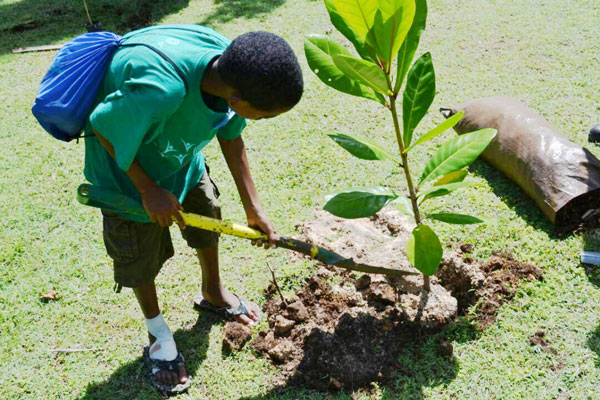
In Zimbabwe, people evidently choose to look at the task of protecting the environment and ensuring that it manages to also sustain generations to come, as the preserve of those employed in the environmental field. However, with the amount of work that is required in the country to restore the environment — aspects of which are now mostly in tatters — all hands are certainly required on deck. If everyone was to make it their life’s duty to play their part, having a sense of obligation towards environmental conservation, things would certainly take a better turn.
environment By Chipo Masara

But then, much as some people may be willing to play their part, they may not be sure what exactly they can do at their individual level or in their homes. Following are some of the seemingly little things that go a long way in preserving and restoring the environment, things that everyone, from all walks of life, is encouraged to incorporate into their lives.
Please don’t litter
Most neighbourhoods — mostly high density suburbs — in the country now resemble dumping sites as people have made it a habit to store their garbage at the back of their homes and then going to dump it at some corner in their neighbourhoods, often in the dark of the night, to avoid prosecution. Because refuse collection is a service some areas are not privileged enough to receive, the mountains of the stinky fly-infested garbage have kept rising, posing serious health risks.
Communities that do not get visited by council garbage collection trucks are encouraged to collectively visit council offices and file a complaint, especially in the case where a refuse fee is part of the council bill they are required to religiously pay. In the case where that route bears no fruit, they may get together and seek the services of private garbage collectors, although these charge an average of $10 per month for each household.
Children need to be encouraged to appropriately dispose of their litter — in a bin — from an early age; that way, chances of them growing up to become litter bugs are lessened. Also important to note is that besides ruining the environment and being a source of preventable diseases, littering is a prosecutable offence that carries a sizeable fine.
Don’t throw it away if you can re-use it
- Chamisa under fire over US$120K donation
- Mavhunga puts DeMbare into Chibuku quarterfinals
- Pension funds bet on Cabora Bassa oilfields
- Councils defy govt fire tender directive
Keep Reading
One only needs to ask a grandmother whose source of income is the peanut butter she makes at her rural home to know how much empty bottles of peanut butter or jam mean to her. When they are cleaned up, they are brought back to life and filled up with newly-made peanut butter for sale — a source of livelihood for her.
When the Mazowe Orange Crush runs out, some may find it appropriate to burn the empty container, or throw it at that garbage dumpsite by the corner, while someone would have found somewhere to store drinking water.
As long as something may be re-used in some way, do not throw it away. You may not need it but there is bound to be someone else that finds use in it. Remember, a lot of resources are taken from the environment to produce the material we use every day.
Save electricity
If there is anything that the electricity shortages that bedevilled Zimbabwe in the last decade should have taught us, it was that the important commodity should be saved as much as possible. Saving electricity reduces your bill and increases your energy security, and most importantly, it reduces the pollution that is emitted from non-renewable sources of energy. To save electricity, switch to energy-saving light bulbs and ensure they are switched off when not in use, among other things that help save electricity in homes and at workplaces.
Do not waste water
Water is so important a commodity that many would opt to go without electricity than without it. Without water, life is messy and unhealthy and many will go to great lengths to get an adequate supply. Visiting areas where people travel long distances on foot just to get a bucket or two of water would make many appreciate the precious liquid and not misuse it.
Seemingly little things like bathing from a bucket instead of a shower, fixing any leakages, turning off the tap while brushing teeth and re-using water for other purposes, go a long way in saving the precious commodity.
Plant a tree
Planting trees is certainly not a preserve for the Forestry Commission or Environment Africa. Everyone, even schoolchildren, should be encouraged to plant at least one tree that they hopefully see grow in their lifetime. It does not have to only be at our houses as we can also volunteer to plant appropriate trees in public places or adopt those already there. Trees are the biggest plants on earth that give us oxygen, stabilise the soil and store carbon dioxide emitted, among a host of other important roles they play.
If each individual, both young and old, took it upon themselves to practise the aforementioned environmentally-friendly little deeds, as well as many others not mentioned, then it would not be long before positive changes were realised in the outlook of the country’s environment.
Feedback: [email protected]/ [email protected]











